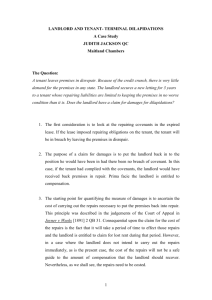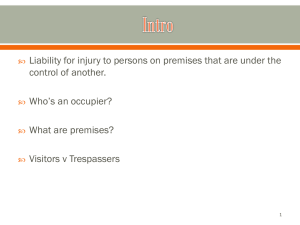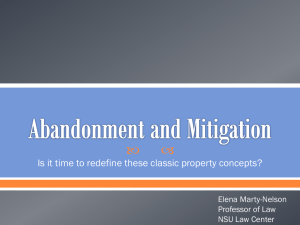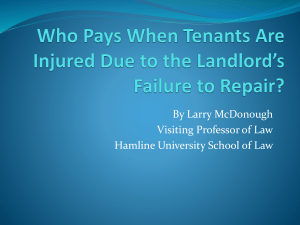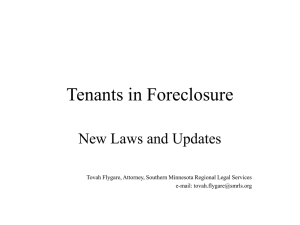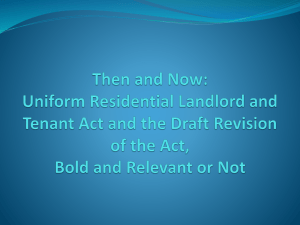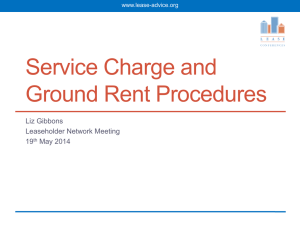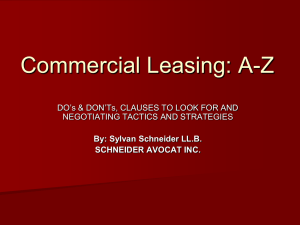Sample Seminar - Radius Consulting
advertisement
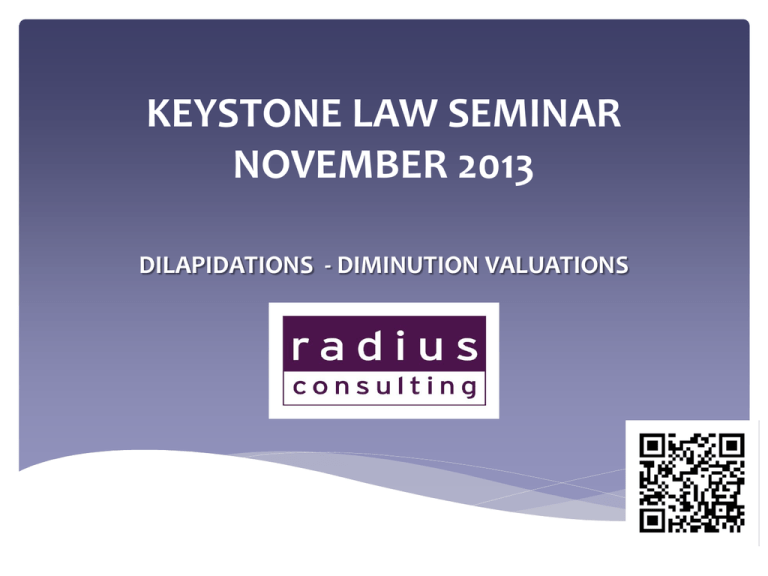
KEYSTONE LAW SEMINAR NOVEMBER 2013 DILAPIDATIONS - DIMINUTION VALUATIONS DIMINUTION VALUATIONS In the latter part of the 19th Century, established rule of law equated damages for failure to yield up in repair to reasonable cost of remedial works Such was “irrespective of the extent to which, if at all, that accorded with the landlord’s real loss” Generally attributed to Joyner -v- Weeks (1891), with Lord Esher MR justifying on grounds that: “It is a highly convenient rule. It avoids all the subtle refinements with which we have been indulged today, and the intensive and costly inquiries which they would involve” DIMINUTION VALUATIONS Fry LJ added: “I cannot help observing that the rule so laid down is one of great practical inconvenience. It is more simple than the inquiry to what extent the reversion is damaged….there is….a complexity about it which unfits it…” Of course that rule – as still effectively applies in Scotland – can result in L being over compensated DIMINUTION VALUATIONS Crucially, it overlooks – as do anti-section 18 propagandists – that ‘Cost’ and ‘Value’ are not the same thing By reverse analogy, imagine adding a £50k Amdega oak conservatory to a 1930’s semi ex-Council house in Wigan……… But the misconception that they equate is oft laboured. That they are interchangeable. One can selectively pick from case law, of course, but as a valuer, Landau -v- Marchbank features eminent common sense in noting that “the fact that repairs are necessary is not in itself (conclusive) evidence of damage to the value of the reversion.” DIMINUTION VALUATIONS The two Limbs of s18 (1) are, as a reminder: First Limb “Damages for a breach of covenant or agreement to keep or put premises in repair during the currency of a lease, or to leave or put premises in repair at the termination of a lease, whether such covenant or agreement is expressed or implied, shall in no case exceed the amount (if any) by which the value of the reversion (whether immediate or not) in the premises is diminished owing to the breach of such covenant as aforesaid.” DIMINUTION VALUATIONS Second Limb “…and in particular, no damage shall be recovered for a breach of any such covenant or agreement to leave or put premises in repair at the termination of a lease, if it is shown the premises, in whatever state of repair they might be, would at or shortly after the termination of the tenancy have been or be pulled down, or such structural alterations made therein as would render valueless the repairs covered by the covenant or agreement.” The Courts have consistently held that the Second Limb is the actual intention of actual Landlord, whilst First envisages the hypothetical sale (letting) to notional purchaser/tenant DIMINUTION VALUATIONS Depending on the ‘age, character and locality’ of the property (after Proudfoot -v- Hart), certain bone fide repair (or reinstatement) items might have little or no impact upon lettability, hence value But how do valuers ‘objectively’ articulate and explain their conclusions? For there is no rule book. No RICS Practice manual Dowding & Reynolds provide helpful worked examples and guidance. Many valuers draw analogies with ‘Red Book’ valuations. Few seem to truly reflect actual market conditions for the actual property type (or very similar). In particular, because of our obsession with ‘comparables’, many cling to very tenuous comparables (see Living Waters), being all that might be available in a ‘transactions famine’. DIMINUTION VALUATIONS What is our approach? Firstly, sound and thorough ‘detective work’ as to: landlord’s intentions, local market etc Has landlord’s agent sold premises to a speculator who capitalised on the difference between costed dilaps and actual open market value impact? (see Wrightstock House example later) DIMINUTION VALUATIONS The ‘value affective’ approach in practice seeks to √ and X items in the Scott Schedule, the latter being items which do not, in our experience, affect lettability/value. Each case on its own merits. Examples to follow ‘Gilding The Lily’. ‘Silk purse from a sow’s ear’. At the RICS Dilapidations Forum Conference 2012 (speakers including Nicholas Taggart, Landmark Chambers; Stephen Jourdan, Falcon Chambers; and David Gilbert, valuer at Lambert Smith Hampton), this approach was supported. DIMINUTION VALUATIONS Instructions can be at an early stage or once negotiations have progressed/been exhausted Protocol requires Section 18 (1) valuation to be sent with Schedule Can assist LL early to provide advice on whether to undertake works, and which works could be defended/challenged from a Section 18 (1) perspective Jervis v Harris clause? Example 1 - 20-26 George Street, Croydon CLAIM – £423,306.82 B.S REC – £300 - £350,000 SECTION 18 VAL – £200 - £220,000 SETTLEMENT - £220,000 CROYDON CROYDON Example 2 – Unit 50c, Queensmere Centre, Slough CLAIM - £52,059.27 SECTION 18 VAL - £Nil Example of excess of supply relative to demand Half of units within same mall vacant SLOUGH Example 3 – Broadmead, Bristol LL CLAIM - £115,000 T’S B.S ASSESSMENT - £60,000 Radius S.18 - £40,000 Settlement - £40,000 Property let by LL to a temp tenant at lease expiry Much of internal fit out (changing rooms, racking etc) used by temp tenant Therefore, if anything, has had a POSITIVE impact upon value Example 4 – Jasper House, London CLAIM - £1.2 million SECTION 18 VAL FOR T- £250,000 RESULT (at Mediation) - £380,000 Section 18 assisted in settlement – in particular to dismiss LL’s claim for loss of rent (large amount of secondary offices on market nearby) Example 5 – Brixton Way, Shrewsbury CLAIM - £661,306.47 SECTION 18 VAL - £175-£200,000 SETTLEMENT - £325,000 LL agreed letting immediately after expiry Detailed analysis of Heads of Terms identified certain works required by ingoing tenant But not all of LL’s Claim - therefore not all works will be ‘value affective’ Example 6 – 36-38 Plume Street, Aston CLAIM - £218,000 SEC 18 VALUATION - £26,500 Industrial Unit – c 20,000 sq ft Limited marketability in any event Number of ‘repairing’ issues simply do not impact upon reversionary value including: Dented / scuffed cladding Decs to internal metalwork/columns Mortar joints Works to boundary walls Carpets/decs to internal offices Spalled/cracked yard surface Replacement of tired kitchen fittings Example 7 – Vicarage Lane, Blackpool Section 18 on behalf of Landlord Landlord’s Claim - £80,000 Tenant’s Offer - £nil Sec 18 Valuation - £50,000 Settlement - £50,000 When faced with offer of £nil, no other option but to obtain S.18 Wrightstock House, Worsley Purchaser had negotiated ‘back-to-back’ surrender, with the tenant agreeing to pay some £400,000 comprised thus: Rent/Rates - £150k Dilapidations - £250k B.S for previous Landlord had served Terminal Schedule at £625k, with former Tenant’s B.S assessing £300-£350k. Purchaser then spent about £100,000 on relevant/most appropriate works (‘value affective) before selling again. Wrightstock House, Worsley Refurbished property then sold for £870,000 with vacant possession Gross mark up for first purchaser of about £330k – illustrating ‘cost’ and ‘value’ not the same What if the LL has done the works? Cost = Value? Common view – if LL has done the works then he has crystallised his claim Not always the case, especially in such a weak market Example 8 - Canterbury Landlord had undertaken works and relet to a new tenant. Seeking cost of works to justify Claim Cost of Works - £150,000 Section 18 - £70,000. Had done considerable decorative works to upper parts – not used by new tenant Settlement - £75,000 Example 9 – Black Horse House, Tunbridge Wells Landlord spent £400k and relet Claim - £195,000 Section 18 - £110,000 Relet at £12.63 psf Local evidence suggested that rent of £14 psf could be achieved on basis of new carpets and redecoration only. Therefore, some of LL works not ‘value affective Settlement - £120,000 DISPUTE RESOLUTION Litigation, Arbitration or Mediation Predominantly Mediation these days Non-cognate Mediator’s generally using ‘reality check’ of huge litigation costs to promote settlement We promote use of a cognate Mediator Settlement more likely or failing that better informed to litigate www.mediatenotlitigate.co.uk Conclusion Tempers the opportunist….


